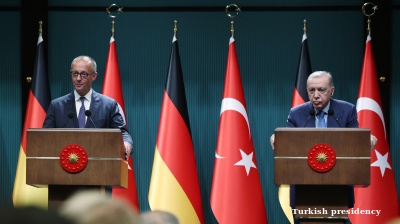Despite a market clamour for Turkey to again push up interest rates, the Turkish central bank’s monetary policy committee (MPC) on July 24 announced that it had decided to keep its main policy rate constant at 17.75%.
The decision to stick with the current one-week repo rate, outlined in a central bank press release, immediately sent the Turkish lira (TRY) into a renewed nosedive. It weakened as far as 4.9384 against the USD following the announcement and was trading at 4.9094, up 3.54% d/d, as of 14:30 local time. The Istanbul stock exchange’s benchmark BIST-100 index was down 2.79% at 92,643.
Prior to the MPC meeting, the markets were forecasting a rate rise of around 100-125 basis points, with annual inflation having hit a 14-year high of 15.39% in June. That expectation firmed on July 23 when newly-appointed finance and treasury minister Berat Albayrak said that Turkey would not fight with the markets but instead would pursue a “win-win” relationship with them. Traders took that as an indication that a rate hike would likely be forthcoming. However, with the central bank opting to not make a move the focus will now be back on whether the regulator’s independence has been fatally undermined by President Recep Tayyip Erdogan, who, taking an unorthodox approach to monetary policy, contends that despite its overheating economy, emerging Turkey can drive more growth and at the same time fight inflation via lower interest rates.
Albayrak is Erdogan’s son-in-law and was appointed on July 9 after the president, two weeks after his triumph in snap landmark elections that saw him made Turkey’s first-ever nearly-all-powerful executive president, moved to surround himself with loyalists. The inexperienced Albayrak replaced former deputy prime minister and ex-Merrill Lynch chief economist Mehmet Simsek, a favourite with investors. Given the decision to not raise rates, worries may again mount over whether he has the competence to placate jittery financial markets and foreign investors.
In a research note released on July 20, Capital Economics concluded that a failure by the central bank to hike policy rates at its upcoming MPC meeting would trigger another TRY sell-off and probably push the regulator into an emergency rate hike anyway. The TRY is now heading towards a 25% collapse against the dollar in the year to date. Looking at the wider economic picture, July 20 also saw Chatham House’s Turkey Project manager Fadi Hakura state in an article published in Time that Turkey is “heading for economic meltdown”.
The lira’s latest record low of 4.97 to the dollar was seen on July 11 after Erdogan predicted a fall in interest rates.
“Cost factors and volatility in food prices have been the main drivers of the recent upsurge in inflation. On the other hand, price increases have shown a generalized pattern across subsectors. Despite the milder impact of demand conditions on inflation, elevated levels of inflation and inflation expectations continue to pose risks on the pricing behaviour. Accordingly, the Committee assessed that it might be necessary to maintain a tight monetary stance for an extended period,” the MPC said in its press release on July 24.
Recently released data indicate a more significant rebalancing trend in economic activity, the MPC also said, adding that external demand maintains its strength, while signs of deceleration in domestic demand become more visible.
News

US push to pressure Iran providing fresh incentive for trans-Caspian pipeline
Turkmenistan showing interest in the idea.

US–China soybean sales restart
According to Scott Bessent, US Treasury Secretary, the agreement marks a significant step towards restoring normalcy for American farmers.

Russia faces $50bn annual losses from oil sanctions as Lukoil exits international assets
Russia is expected to lose at least $50bn annually due to oil-related sanctions, as Moscow’s largest private oil producer Lukoil agrees to sell its international assets and Germany considers nationalising operations owned by state-run Rosneft.

Chicken and chips in Seoul - for Nvidia, Samsung and Hyundai
In a low-key fried chicken shop in southern Seoul, the leaders of Nvidia, Samsung Electronics and Hyundai Motor held an informal meeting on the evening of October 30.



